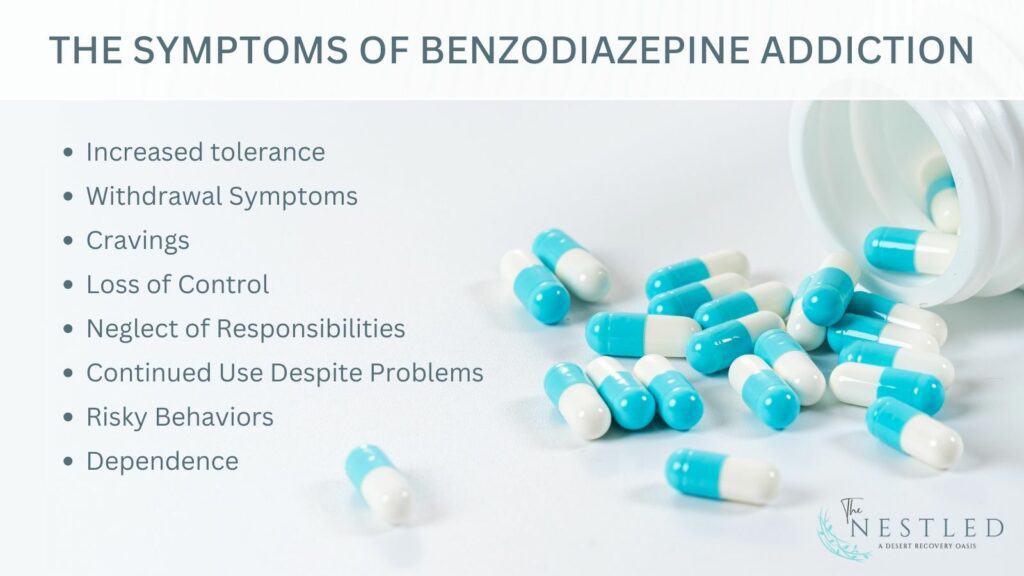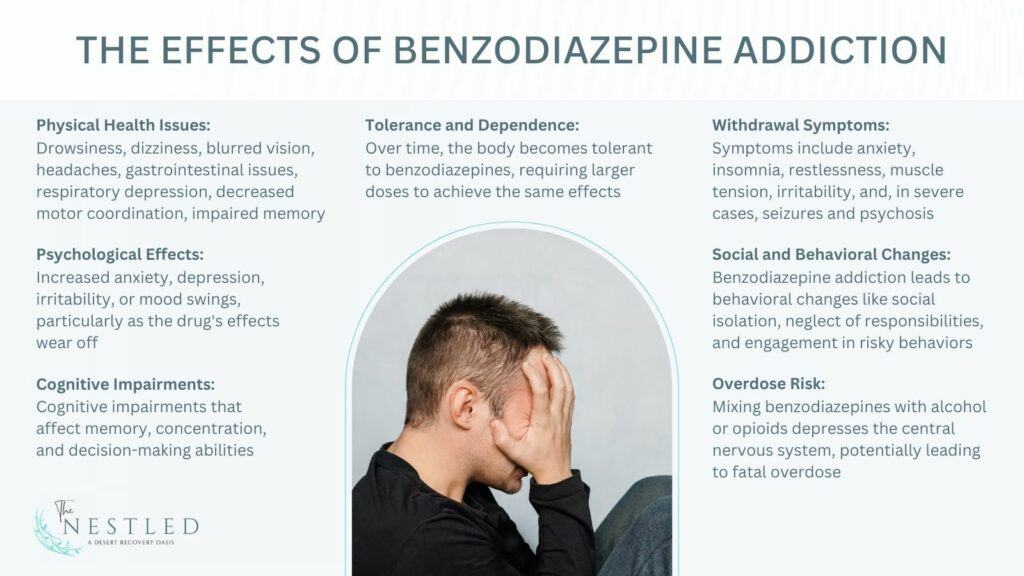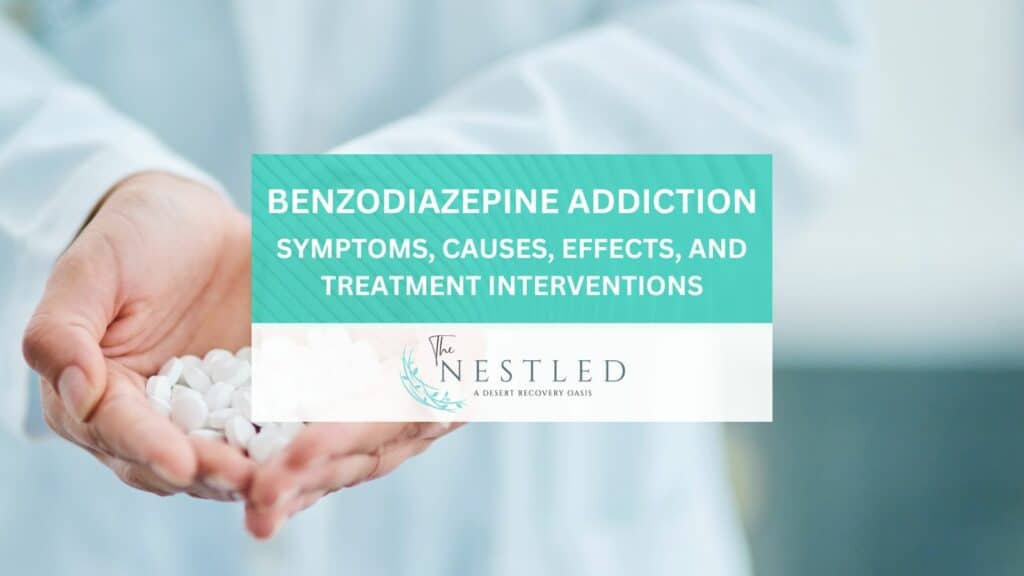Benzodiazepine addiction refers to an intense physical and psychological dependence on benzodiazepines despite the adverse effects it has on its users. Benzodiazepine is a class of drugs used for treating anxiety, insomnia, and other conditions. According to a 2019 research by Maust Donovan T. et al ‘Benzodiazepine Use and Misuse Among Adults in the United States,’ a total of 30.6 million adults (12.6%) reported past-year benzodiazepine use-25.3 million (10.4%) as prescribed, and 5.3 million (2.2%) misuse. Misuse accounted for 17.2% of overall use.
The symptoms of benzodiazepine addiction include increased anxiety, sleep disturbances, irritability, increased tolerance, and intense cravings for the drug. Other signs include slurred speech, coordination problems, drowsiness, memory issues, mood swings, confusion, and difficulty concentrating.
The causes of benzodiazepine addiction involve prolonged use beyond the prescribed duration or dosage, history of substance abuse, underlying mental health disorders, and environmental factors such as stress or peer influence.
The effects of benzodiazepine addiction include cognitive decline, neurological damage, and an increased risk of accidents due to impaired motor skills. Socially, it leads to withdrawal from relationships, reduced occupational productivity, and financial problems.
Treatment interventions for benzodiazepine addiction include medically supervised detoxification, therapy sessions, support groups, and lifestyle modifications.
What Is Benzodiazepine Addiction?
Benzodiazepine addiction is a condition where individuals become reliant on benzodiazepines. Benzodiazepines are drugs prescribed for anxiety, insomnia, and several other medical conditions. However, inappropriate or prolonged use increases the chances of addiction due to increased tolerance.
According to Maust, Donovan T. et al.’s 2018 study, ‘Benzodiazepine Use and Misuse Among Adults in the United States,’ 5.3 million adults misused benzodiazepine in the past year.
Addiction to benzodiazepine forms through prolonged or inappropriate use of the drug, leading to tolerance and withdrawal symptoms. Individuals addicted to benzodiazepines experience a range of symptoms, including increased anxiety, cravings, and severe physical and psychological effects. These effects make it difficult to cease use without medical help.
Benzodiazepine addiction not only affects personal health but also leads to significant social and behavioral problems. Its treatment is complex and includes medical detox and long-term therapeutic support.
What Are The Symptoms Of Benzodiazepine Addiction?

According to the American Addiction Centers, the symptoms of Benzodiazepine addiction include increased tolerance, dependence, cravings, loss of control, continued use despite its consequences, and adverse effects upon withdrawal and risky behaviors.
- Increased tolerance: benzodiazepine addiction causes a need to consume larger doses of benzodiazepines to achieve the same calming or sedative effects that smaller doses once provided.
- Withdrawal Symptoms: According to the American Addiction Centers, people with benzodiazepine addiction experience unpleasant physical and psychological effects when not taking the drug, such as shaking, sweating, increased anxiety, irritability, and sleep disturbances.
- Cravings: Strong and persistent urges to use benzodiazepines, which then dominate the addicted individual’s thoughts and behaviors.
- Loss of Control: Difficulty in controlling the amount and frequency of benzodiazepine use, often taking more than intended or using it for more extended periods than planned.
- Neglect of Responsibilities: Failing to meet professional, social, or family obligations due to time spent using or recovering from the effects of benzodiazepines.
- Continued Use Despite Problems: Continuing to use benzodiazepines even when it causes physical or psychological problems, including deteriorating relationships and occupational difficulties.
- Risky Behaviors: Engaging in hazardous activities while under the influence of benzodiazepines, such as driving or operating machinery.
- Dependence: Individuals with benzodiazepine addiction experience a physiological state where the body adjusts to the presence of the drug, leading to dependence. This dependence is characterized by specific withdrawal symptoms when intake is reduced or stopped.
Other common symptoms include:
- Slurred speech
- Coordination problems
- Drowsiness
- Blurred vision
- Memory impairment
- Mood swings
- Irritability
- Depressive symptoms
- Decreased motivation
- Anxiety
What Are The Causes Of Benzodiazepine Addiction?
The Ohio Hospital for Psychiatry reports that the most widely recognized causes and risk factors for benzodiazepine addiction include genetic predisposition, environmental and psychological factors.
- Prolonged Use: Extended use of benzodiazepines, especially beyond the prescribed duration, significantly increases the risk of developing an addiction. These medications should be for short-term use because of their addictive potential.
- Coping Mechanism: Individuals tend to misuse benzodiazepines to cope with stress, anxiety, or sleep problems on their own, without medical guidance, which increases the risk of addiction. According to the 2021 National Survey on Drug Use and Health (NSDUH), 1.4 million individuals aged 12 and older in the US reported using a sedative or tranquilizer, including benzodiazepines, in the previous month.
- Genetic Predisposition: Genetic factors play an essential role in how prone an individual is to addiction. Those with a family history of substance abuse are generally at higher risk.
- Psychological Factors: People with mental health issues are more susceptible to benzodiazepine addiction. This susceptibility is often due to initially using these drugs for legitimate therapeutic reasons.
- Environmental Influences: Environmental factors such as exposure to high-stress situations, peer pressure, or living in an environment where drug use is prevalent also contribute to the beginning and continuation of drug use and eventual addiction.
What Are The Effects Of Benzodiazepine Addiction?

Benzodiazepine addiction has a profound impact on both physical and mental health, as well as on social and behavioral aspects of a person’s life. A 2023 report by the National Center for Health Statistics reveals that drug overdose deaths involving benzodiazepines increased from 9,711 in 2019 to 12,499 in 2021. The following are some of the critical effects of benzodiazepine addiction:
- Physical Health Issues: The American Addiction Centers states that the side effects of benzodiazepine include drowsiness, dizziness, blurred vision, headaches, and gastrointestinal issues. In more severe cases, it causes respiratory depression, decreased motor coordination, and impaired memory.
- Psychological Effects: Benzodiazepines alter mood and behavior. Long-term use often leads to dependency, and users may experience increased anxiety, depression, irritability, or mood swings, particularly as the drug’s effects wear off. It can also induce paradoxical reactions such as increased anxiety, aggression, and suicidal thoughts.
- Cognitive Impairments: Addiction to benzodiazepine use is associated with cognitive impairments that affect memory, concentration, and decision-making abilities. These mental effects persist even after discontinuation of the drug.
- Tolerance and Dependence: Over time, the body becomes tolerant to benzodiazepines, requiring larger doses to achieve the same effects. This increased dosage heightens the risk of addiction and other adverse effects.
- Withdrawal Symptoms: Withdrawal from benzodiazepines is challenging and dangerous. Symptoms include anxiety, insomnia, restlessness, muscle tension, irritability, and, in severe cases, seizures and psychosis.
- Social and Behavioral Changes: Benzodiazepine addiction leads to behavioral changes like social isolation, neglect of responsibilities, and engagement in risky behaviors. It also leads to legal problems or financial issues due to spending excessive amounts on acquiring the drug.
- Overdose Risk: Benzodiazepines, when taken together with other depressants like alcohol or opioids, affect the central nervous system. Overdose is fatal and requires immediate medical attention.
What Are The Treatment Interventions For Benzodiazepine Addiction?
The treatment options for benzodiazepine addiction are detoxification, behavioral therapy, counseling, Medically-Assisted Treatment, family therapy, and aftercare planning.
- Medical Detoxification: Detoxification under medical supervision is the first step in treating benzodiazepine addiction. Withdrawal from benzodiazepines is severe and potentially life-threatening (involving seizures or psychosis). It is safest to detox in a controlled environment where medical professionals will monitor the addicted patient’s health and manage withdrawal symptoms.
- Tapering Off: Gradual tapering of the drug is necessary to minimize withdrawal symptoms. The tapering schedule varies based on the duration and intensity of benzodiazepine use. It also sometimes involves switching to a longer-acting benzodiazepine before gradually reducing the dosage.
- Cognitive Behavioral Therapy (CBT): CBT is a form of psychotherapy that helps addicted individuals identify and change harmful behaviors and thought patterns. For benzodiazepine addiction, CBT helps patients manage withdrawal symptoms, develop coping strategies, and address any underlying anxiety or depression.
- Counseling and Support Groups: Individual counseling, group therapy, and support groups provide emotional support and help people addicted to benzodiazepine maintain sobriety.
- Medication-Assisted Treatment (MAT): While there are no FDA-approved medications specifically for benzodiazepine addiction, other drugs help reduce withdrawal symptoms and co-occurring disorders. For example, antidepressants may be prescribed for underlying depression or anxiety.
- Family Therapy: Involving family members in the recovery process increases the chances of improvement in the treatment. It enhances support systems and addresses any family dynamics that contribute to the addiction.
- Aftercare Planning: Successful treatment of benzodiazepine addiction also includes aftercare planning to prevent relapse. This plan involves ongoing therapy, support group meetings, and sometimes living in a sober living environment.
What Are The Types Of Benzodiazepine?
The 18 types of benzodiazepine are;
- Alprazolam (Xanax)
- Clonazepam (Klonopin)
- Diazepam (Valium)
- Lorazepam (Ativan)
- Temazepam (Restoril)
- Chlordiazepoxide (Librium)
- Oxazepam (Serax)
- Clorazepate (Tranxene)
- Midazolam (Versed)
- Triazolam (Halcion)
- Flurazepam (Dalmane)
- Estazolam (ProSom)
- Quazepam (Doral)
- Bromazepam (Lexotan)
- Nitrazepam (Mogadon)
- Flunitrazepam (Rohypnol)
- Clobazam (Onfi)
- Lormetazepam (Noctamid)
These medications vary in their onset of action, duration of effect, and potency, allowing for individualized treatment based on the specific condition being treated and the patient’s needs.
Where To Find Treatment For Benzodiazepine Addiction?
Treatment for benzodiazepine addiction can be found at rehabilitation centers, addiction treatment facilities, or through medical professionals specializing in addiction recovery.
What Are The Various Forms Of Benzodiazepine?
Benzodiazepine is available in different forms, including tablets, capsules, and liquid forms.
What Are The Different Slang Terms For Benzodiazepine?
Slang terms for benzodiazepine include benzos, downers, and tranks.
What are the risks of combining benzodiazepines with other substances, such as alcohol or opioids?
Combining benzodiazepines with other substances, particularly alcohol or opioids, significantly increases the risk of severe side effects and potentially fatal outcomes. Both benzodiazepines and alcohol are central nervous system depressants, and their combined use can lead to enhanced sedation, respiratory depression, and even death. Similarly, mixing benzodiazepines with opioids like morphine can result in dangerous respiratory depression and overdose. It is crucial for individuals to be aware of these risks and for healthcare providers to monitor and manage poly-substance use carefully. Treatment plans should include education on the dangers of mixing substances and strategies to prevent these high-risk behaviors.
How And Where Is Benzodiazepine Typically Produced?
Benzodiazepine is usually manufactured by pharmaceutical companies and is produced in controlled environments.
What Are The Law Enforcement Actions And Legal Ramifications Of Benzodiazepine?
Law enforcement agencies focus on controlling benzodiazepine distribution and use through legal means.
How does benzodiazepine addiction increase the risk of developing a tobacco addiction?
Benzodiazepine addiction can increase the risk of developing a tobacco addiction due to the intertwined nature of substance use behaviors and the pursuit of relief from withdrawal symptoms. Individuals addicted to benzodiazepines may turn to tobacco as an alternative or additional coping mechanism for managing anxiety and stress, particularly during periods of withdrawal. Both substances can create a reinforcing cycle of dependency, complicating treatment and recovery.
What Are The Policies And Implications Related To Benzodiazepine Control?
Policies regarding benzodiazepine control aim to regulate its production, distribution, and use.
What Are The Legal Penalties For Using And Selling Benzodiazepine?
The legal consequences for using and selling benzodiazepine include fines, imprisonment, and legal records.
How Do The Effects Of Benzodiazepine Addiction Differ From Those Of Heroin Addiction?
The effects of benzodiazepine addiction differ from heroin addiction in terms of their impact on the body and mind.

Share This Post




